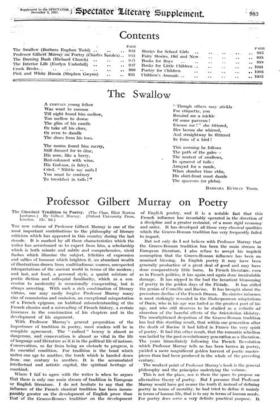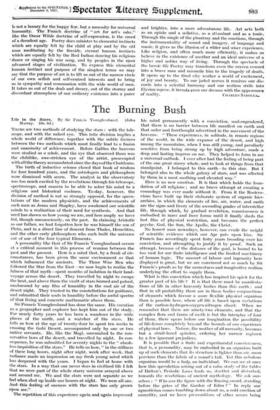Professor Gilbert Murray on Poetry
THE new volume of Professor Gilbert Murray is one of the most important contributions to the philosophy of literary criticism which has appeared in this country during the last decade. It is marked by all those characteristics which the writer has accustomed us to expect from him, a scholarship which is both minute and subtle and comprehensive, vivid flashes which illumine the subject, felicities of expression and sallies of humour which brighten it, an abundant wealth of illustrations drawn from multitudinous sources, unexpected interpretations of the ancient world in terms of the modern ; and last, not least, a personal style, a quaint mixture of poetic diction and colloquial familiarity, which as a con- cession to modernity is occasionally exasperating, but is always arresting. With such a rich combination of literary virtues, one may easily forgive Professor Murray many sins of commission and omission, an exceptional misquotation of a French epigram, an habitual misunderstanding of the French classics and a misreading of French history, a certain looseness in the construction of his chapters and in the development of his argument.
With Professor Murray's general proposition of the importance of tradition in poetry, most readers will be in complete agreement. The " radical " heresy is almost as dangerous, and conservatism. is almost as vital in the life of language-and literature as it is in the political life of nations. Conservatism, so far from being an obstacle to progress, is its essential condition. For tradition is 'the bond -which unites one age to another, the torch which is handed down from ' one century to another. It is the accumulated intellectual and artistic capital, the spiritual heritage of
mankind. •
Where I fail' to agree with the writer is when he argues that there is only one main stream of tradition in European -or English literature. I do not hesitate to say that the influence of the" French classical tradition has been incom- parably greater on 'the development of English prose than that : of the Graeco-Roman tradition on the development
of English poetry, and it is a notable fact that this French influence has invariably operated in the direction of a discipline and a greater restraint, of a more rigid economy and order. It has developed all those very classical qualities which the Graeco-Roman tradition has very frequently failed to impart.
But not only do I not believe with Professor Murray that the Graeco-Roman tradition has been the main stream in European literature, I also refuse to accept his implicit assumption that the Graeco-Roman influence has been an unmixed blessing. In English poetry it may have been generally productive of a great deal of good and may have done comparatively little harm. In French literature, even as in French politics, it has again and again done incalculable damage. It has nipped in the bud the luxuriant blossoming of poetry in the golden days of the Pleiade. It has stifled the genius of Corneille and Racine. It has brought about the premature decline of the French Drama. Its sinister influence is most strikingly revealed in the Shakespearean adaptations of Ducis, who in his age was hailed as the greatest poet of his age, and who still deserves to be studied as a reductio ad absurdum of the baneful effects of the Aristotelian idolatry. The unenlightened despotism of the Graeco-Roman tradition has had this startling result, that within one generation after the death of Racine it had killed in France the very spirit of poetry. It had this other result, that the romantic rebellion was hailed by the post4evolutionary generation as a liberation. The years immediately • foLlOwing the French Revolution :which Professor Murray tells us has been barren in poetry, yielded a more Magnificent golden harwst of poetic master- -pieces than had been produced in the whole of the preceding century.
The weakest point of Professor Murray's book is the general philosophy and the principles underlying the volume.
This is not the place, nor is there the space to propose an alternative theory of poetry. But I presume that Professor Murray would have got nearer the truth if, instead of defining poetry in terms of morality, he had tried to define it mainly in terms of human life, that is to say in terms of human needs. For poetry does serve a very definite practical purpose. It is not a luxury. for the happy fe?i, but _a_ necessity for universal humanity. The French doctrine:of " art for art's sake,"- like the Oscar Wilde doctrine of self-expression; is the creed of a decadent age. Poetry does minister to elemental instincts which are equally felt by the child at play and by the old man meditating -by the fireside, eternal human instincts which are equally felt by the Red Indian dancing his religious a dance or singing his war song, and by peoples in the ir;rost advanced stages of civilization. To express this elefnental human instinct and purpose of the simplest terms we rimy say that the purpose of art is to lift us out of the narrow circle of our own selfish and self-centred interests and to bring us in sympathy and communion with the wide world of men. It takes us out of the drab and dreary, out of the stormy and discordant atmosphere of our ordinary existence into a purer and brighter, into a more adventurous life: Art acts 'both as an. opiate. and a sedative, as a stknulant and as a tonic. m
Through the magic of the phantasy and the emotions, through the instrumentality of sound and imagery, of language and music, it gives us the illusionof a wider and .wiser experience. Like religion, and often much more efficiently, it makes us believe in the existence of another and an ideal universe of a higher and nobler way of living. Through the spectacle of the heroic life Poetry may transform even the craven coward into a brave man and reconcile him to the tragedy of death. It opens up to the tired city worker a world of excitement, of joy and beauty. To our jaded nerves it resolves our dis- cords into a .celestial harmony and our restless strife into Elysian repose, it invests even our dreams with the appearance











































































 Previous page
Previous page